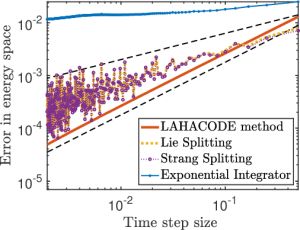The LAHACODE project of Professor Katharina E. Schratz is located on the narrow border between analysis and numerics. For this project at Karlsruhe Institute of Technology (KIT), the mathematician has now received an ERC Starting Grant. The European Research Council has decided to fund the project with EUR 1.5 million for a duration of five years. Within LAHACODE, Schratz develops innovative numerical methods for nonlinear partial differential equations describing complex phenomena in nature and engineering. For the first time, these methods will enable reliable structure-preserving approximation solutions for nonsmooth problems.
Ultra-cold atoms or superheated matter, self-learning algorithms or the circulation of brain fluid in humans: partial differential equations, the solutions of which depend on several variables and their derivations, describe a wide spectrum of major phenomena in nature and engineering. Nonsmooth problems in which solutions of underlying partial differential equations oscillate highly, represent particular
challenges in mathematics. Standard methods often cannot resolve these high oscillations precisely, which causes classical approximations to fail. Nonsmooth phenomena, such as turbulences or high frequencies, however, play an important role in modeling physical systems.

In her project LAHACODE (Low regularity and high oscillations: numerical analysis and computation of dispersive evolution equations), Katharina E. Schratz plans to make a decisive step towards closing this gap by developing reliable computer-based numerical methods for an important class of nonlinear partial differential equations with nonsmooth solutions. The project aims at innovative approximation solutions that numerically preserve the underlying structures, the so-called resonances.
The European Research Council (ERC) will fund LAHACODE with a starting grant in the amount of EUR 1.5 million for five years. The grant addresses excellent young scientists with promising research projects. Katharina E. Schratz is the only woman who receives an ERC Starting Grant in mathematics in 2019. The born Austrian headed the young investigators group “Numerics of Time-Dependent Partial Differential Equations” at KIT. Meanwhile, she conducts research and teaches at the Heriot-Watt University in Edinburgh.
Being “The Research University in the Helmholtz Association”, KIT creates and imparts knowledge for the society and the environment. It is the objective to make significant contributions to the global challenges in the fields of energy, mobility, and information. For this, about 10,000 employees cooperate in a broad range of disciplines in natural sciences, engineering sciences, economics, and the humanities and social sciences. KIT prepares its 22,800 students for responsible tasks in society, industry, and science by offering research-based study programs. Innovation efforts at KIT build a bridge between important scientific findings and their application for the benefit of society, economic prosperity, and the preservation of our natural basis of life. KIT is one of the German universities of excellence.

